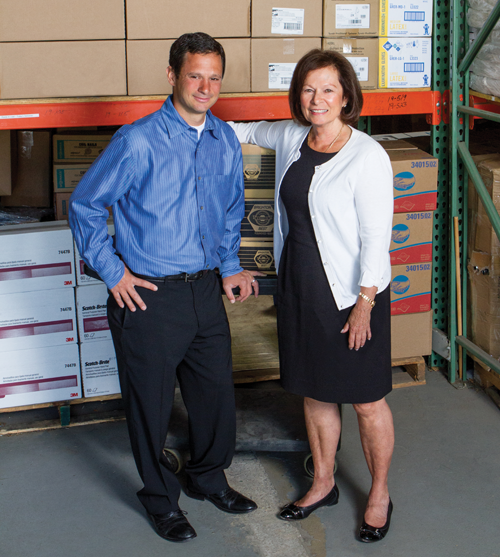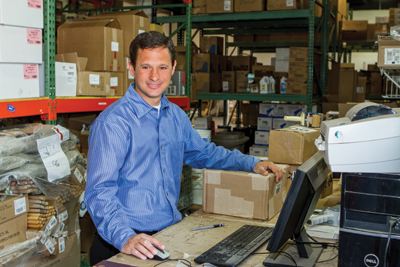Quick, nimble, creative
Membership in three groups helps Cicero Mfg. & Supply succeed
 |
|
Craig Snower (left) is lead salesman for Cicero Mfg. & Supply, a woman-owned company owned by his mother, Terry Snower. |
By Rich Vurva
Customers who prefer to do business with small, locally owned companies frequently say they like knowing that their dollars support the local economy. They also appreciate the fact that they have direct access to the company’s owners, who can make quick decisions tailored to fit the customer’s needs. But they also acknowledge that small businesses sometimes lack access to more sophisticated business practices, and have limited resources.
Terry Snower, owner and managing director of Cicero Mfg. & Supply in Glenview, Ill., recognizes both the strengths and weaknesses of her company. One way she has overcome the perceived weaknesses is by becoming active in organizations that expand her company’s capabilities.
In particular, she cites participation in three groups:
- The Industrial Supply Association
- The Women’s Business Development Center
- The Goldman Sachs 10,000 Small Businesses program
Membership in those three organizations helped this small, independent, woman-owned company build contacts that enabled Cicero Mfg. & Supply to keep afloat following a major economic downturn and a personal family crisis.
Snower took over ownership of the Chicago area company under trying circumstances. The company was founded by her father-in-law in 1951 and later passed down to his son, Jim. Terry became active following her husband’s cancer-related death in 2006. For two years, Jim and Terry’s son, Craig, the top salesman for the company, maintained his sales job and also handled other administrative roles.
By 2008, it became apparent that Craig was wearing too many hats, so Terry decided to step in to relieve her son of some of his administrative duties so he could focus more of his time on sales. With her background as a certified public accountant (she started her career teaching bookkeeping in the Chicago public schools) and an MBA, Terry brought financial acumen and a fresh perspective to the business.
“For many years, this company was run like a typical mom and pop business, but without the mom,” she laughs.
With knowledge gained from 10 years in corporate finance, Terry introduced a more disciplined approach to budgeting, forecasting and other business practices. With Craig focused on serving customers and Terry keeping an eye on day-to-day administrative tasks, sales and profits were trending upward. “We’ve been able to combine Craig’s knowledge of customers and products with my business skills, and that’s how we’ve gotten to this point,” she says.
Then came the Great Recession in the fall of 2008.
 |
| Laura Hixson, Mike Horn and Steve Pollan are key members of the staff of this independent distributor based near Chicago. |
Like many small businesses at the time, Cicero Mfg. & Supply received a dreaded “Dear Customer” letter from the bank saying they must pay off their line of credit. Thankfully, the amount of money owed wasn’t very large. Using personal savings, retirement money and funds from her late husband’s insurance settlement, Snower managed to put together enough cash to pay off the bank, meet payroll and keep the company afloat despite declining sales.
Thanks to the hard work of a small, yet dedicated staff, and a core group of loyal customers, the company managed to survive the economic downturn. Today, the eight-employee company is approaching $10 million in annual sales, debt free and focused on growth.
Seeking outside advice
Snower credits much of the company’s success on a decision to become more actively involved in business groups and associations. At the urging of Patrick McKeever of the manufacturer’s representative firm Durrie Sales, Snower decided to join the Industrial Supply Association. She attended her first ISA convention in 2010, where she picked up a few new lines and made valuable contacts with other companies in the industrial supply channel. She also became active in ISA’s new Women Industrial Supply Executives Group and encouraged one of her employees to participate in ISA’s Emerging Leaders group for young executives.
“Some people like to say ‘stick to what you know.’ You can’t stick to what you know. You have to learn more and you have to know more,” she says. “That’s what membership in ISA has given us.”
Goldman Sachs 10,000 Small Businesses
Snower was among about 30 business owners who participated in the inaugural Goldman Sachs program in the Chicago area. The program is delivered through partnerships between local community colleges, business schools, community financial institutions and leading nonprofit organizations. It is designed to help entrepreneurs create jobs and economic opportunity by providing them with greater access to education, financial capital and business support services.
Participants complete a 12-week business course, learn to identify business opportunities and develop leadership skills, and design a customized, five-year growth plan for their individual companies.
“Part of the growth plan that I developed was to get into some government contracts, which has been a very good thing for us,” says Snower.
According to a report from Babson College, the small business owners who have completed the educational component of the Goldman Sachs 10,000 Small Businesses program grow their revenue and create jobs at rates that outperform the broader economy.
Women’s Business Development Center
Joining the Chicago-based Women’s Business Development Center has helped the company make new business contacts and build a support network. Attending WBDC events has opened Snower’s eyes to new business opportunities. For example, it was through the WBDC that she first learned how to bid on government contracts. That spawned the launch of a subset of business that enabled the company to become less dependent on manufacturing.
The government sales effort is run by Mike Horn, a long-time friend who was a senior executive at Panasonic for 30 years. Terry coaxed him out of retirement to explore government sales opportunities for Cicero. He helped land a contract with the state of Illinois for safety supplies and has established business with local and county governments.
“It has taken a lot of work to build the government business. The first year, you try and try and nothing happens. You may get one order here and there. Then, you find an opening in another area. Maybe you get a small contract and it starts to build. Once you’re known in the area, people come back and call you,” Horn says.
Like with Cicero’s traditional customers, buyers at all levels of government appreciate a source of supply that is fast, reliable and cost-effective.
Expansion plans
In the early days, the company was primarily focused on selling abrasives and fasteners to Chicago area metal working manufacturers. Today, the product line has expanded to include cutting tools, safety products, janitorial supplies, adhesives and other industrial supplies. Metal fabricators are still the biggest customer segment, but Cicero also serves OEMs, plastic injection molders, and industries such as commercial woodworking, printing and food manufacturing.
“We have transitioned from being an 80 percent MRO shop and a 20 percent production shop to being a 50/50 type of business. In this day and age of lean manufacturing where a customer wants better control of inventories, we have had to become more of a warehouse for our end-users,” explains Craig.
 |
| "The best compliment you can get is if someone goes from Company A to Company B and gives you a call and says, ‘I am here now. I want to order from you,'" says Craig Snower. |
Most of the inventory in Cicero’s warehouse is dedicated to specific customers. Tight inventory control practices, such as cross-docking, gets products in and out of the warehouse quickly to minimize carrying costs and space requirements. “But as we’re getting into more categories and getting more opportunities, we are going to need more warehouse space,” Craig says, which might require moving to a new location in the not too distant future.
The company also manages some onsite inventory programs for customers and is exploring developing a partnership with a local vendor to offer automated vending solutions. “It has to make economic sense,” suggests Craig. “When I see a $10,000 machine and there’s 10 pairs of safety glasses in there that are worth $1.50 a pair, that doesn’t justify the cost of the machine.”
Terry and Craig both anticipate that the company will continue to grow at a steady pace.
“Most of our growth is through referrals or when someone moves from one company to another and brings us with them,” says Craig. “The best compliment you can get is if someone goes from Company A to Company B and gives you a call and says, ‘I am here now. I want to order from you.’”
He adds that customers appreciate doing business with Cicero because they know they can always get in touch with key decision makers. Unlike large competitors with layers of management that can be hard to penetrate, every employee at Cicero Mfg. & Supply is capable of solving their problem or putting them in contact with someone who can. It’s how the company has earned a reputation for being quick, nimble and creative.
This article originally appeared in the Nov./Dec. 2015 issue of Industrial Supply magazine. Copyright 2015, Direct Business Media.













